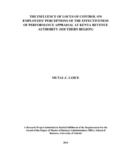The influence of locus of control on employees' perceptions of the effectiveness of performance appraisal at Kenya Revenue Authority(Southern region)
Abstract
Locus of control (Rotter, 1966) is a significant personality variable in the organization.
Some people feel personally responsible for the things that happen to them – internals.
Others feel that outcomes in life are determined by forces beyond their control e.g luck,
fate or powerful others) – externals. This study aimed at examining the influence of locus
of control on employee’s perception of the effectiveness of performance appraisal at
Kenya Revenue Authority (Southern Region). The study was guided by the following
objectives: to identify the locus of control orientation (internals or externals) of
employees at Kenya Revenue Authority (Southern Region) and to find out the influence
of locus of control on employee’s perceptions of the effectiveness of performance
appraisal at Kenya Revenue Authority (Southern Region). This study employed a
descriptive cross-sectional survey. The population of interest was all 1176 employees at
KRA (SR) who undergo performance appraisal. A sample size of 118 employees was
selected using stratified random sampling due to the heterogeneity of the population.
Primary data was collected using structured questionnaires while data was analyzed using
descriptive and inferential statistics. Descriptive statistics included frequencies,
percentages, mean and standard deviation. Pearson’s moment product correlation was
used as an inferential statistic method to draw a causal relationship between locus of
control and employees’ perceptions of performance appraisal effectiveness. The data
results were presented on frequency tables. The findings of the research revealed that
majority of the respondents 57.8% were found to be externals. A statistically significant
positive correlation between locus of control and employee’s perception of the
effectiveness of performance appraisal, (r = .867) (p<0.05) was also found to exist.
Understanding employees’ locus of control and how they influence effectiveness of
human resource practices for example performance appraisal therefore is of practical use
to organizations, as locus of control can be altered.
Publisher
University of Nairobi
Description
Thesis

